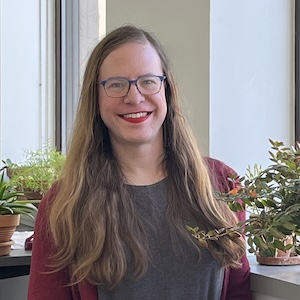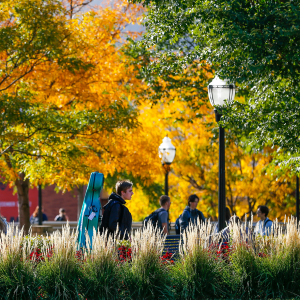Neerja Singh
As an experienced and committed public servant, Civic Engagement (CIVE) master’s student Neerja Singh understands that the work of social justice is never done. For the past six years, she has been at the Minnesota Department of Human Services (DHS), first as a deputy director and now as Clinical Research Director in the office of Medicaid Medical Director.
“What I do,” she explains, “is make sure that we are using public policy to address inherent racial and gender disparities in Minnesota around health care. That’s what I live and breathe.”
Striving to Be Authentic and Equitable
Neerja has a master’s in social work and a PhD in psychology. She is also a 2023 Bush Fellowship recipient. When she told the Bush Foundation that she wanted to go to the University of Minnesota, they wondered what it was really going to do for her.

“I realize how we do civic engagement and public policy is not really authentic,” she says about her desire to pursue this degree. “One of the goals in my Bush Fellowship was to develop models of authentic civic engagement through an equity lens. So the (CIVE) program just kind of stood out.”
The need for more authentic engagement with communities became even more evident during the pandemic. Neerja’s team at the DHS works on policies and issues that aim to dismantle health care disparities. They were instrumental in getting telemedicine approved for mental health services, which had never been done before to the extent it is being used right now.
“It was like overnight,” she says, about how quickly they were able to bring some mental health services online. And while the online service helped many, there were still some, particularly in communities of color, who could not access it due to issues with broadband access or the cost of Wi-Fi.
That was an eye-opening experience for her, realizing that “even something like a color blind virus (can) target people from certain zip codes.”
Rising Up and Staying Motivated
Neerja grew up in India, the daughter of two school teachers. She remembers how the inherent caste system there determined your social status and your access to resources. “My dad never let us use our last names because that depicts the caste you belong to,” she says. “That was his way of standing up to it.”
She questioned the injustice at an early age. “Why is it that somebody who's born in a certain part of the city gets to enjoy access to parks, health care, and public transportation? Just one household versus this one, and everything changes—that really bothers me.”
Neerja says she feels like “a public servant with civil disobedience” in her heart. “With age, maturity, maybe I am getting a little bit calm about it, but I just can't stop.”
From the Classroom to the Conference Room
Neerja says she thrives on challenging herself and others, and the Civic Engagement program definitely challenges her. She is broadening her perspectives and skill set by taking courses on project management, water empowerment, and even a course on healthy eating.
“I plan to take full advantage of the flexibility that the program offers,” she says. “This is one of the very few grad schools I have come across that offer so much flexibility.”
All of the professors have been helpful, she continues. “Just reach out. Don't feel embarrassed, because people are so willing to help here, it's just amazing.”
Currently in her Civic Engagement classwork, they are learning how to rethink the communication approaches used when working with communities. Should the state be saying that they give and a community receives? “Let's change the language,” Neerja says. ”We're not giving anything. It's co-creation.“

Neerja has been able to apply what she is learning directly to her policy-making efforts, especially the framework discussed in Professor Gaynor’s class, Diversity and Public Policy. In it, she talks about the narratives that the dominant culture has established and how to not only recognize them, but work to change them.
“Getting perspective from class and bringing it back to the state has been super helpful,” she says. Neerja referred often to the idea of a dominant culture during her presentation at the Women’s Leadership and Empowerment Conference in Bangkok earlier this year.
In Critical Approaches to Civic Engagement, taught by Professor Tom Borrup, a guest speaker spoke to the class about the Theater of the Oppressed, a theatrical concept developed by Brazilian dramatist Augusto Boal. Basically, it is a form of interactive theater that aims to turn spectators into performers as they tackle social and political challenges and act out potential solutions.
This practice intrigued Neerja so much that she signed up for an acting class. “I had never thought ever in my life I would do that,” she laughs. “It’s beautiful. I'm learning how you can use theater and art in civic engagement. Never, ever would I have really thought about that.”
She even got accepted to present at the Pedagogy and Theater of the Oppressed Conference in Florida this June. “I never could imagine I'd present on theater as a civic engagement strategy. I owe that to the school.”
Advice for Future Students

“Come with a very open mind and be ready to challenge your preconceived notions about civic engagement. Sit with the feeling of discomfort because the school is very safe. I think when people get into these classrooms and these very courageous conversation spaces, we start feeling uncomfortable, and we start equating it with feeling unsafe. Those are two very different things.”
“Have your goals figured out. What are you trying to get out of it? Every time I had been in a class, there was always a motive, what I needed to get the job or pass this licensure. This is the first time in my life I'm going for the sake of learning, and I think I am doing the best because of that.”
Mia Boos is a writer and content strategist with the College of Continuing and Professional Studies, covering the College’s graduate programs and undergraduate individualized degree programs. She joined the CCAPS Marketing team in 2014 and has worked for Thomson Reuters and New York University. Connect with her via LinkedIn.








